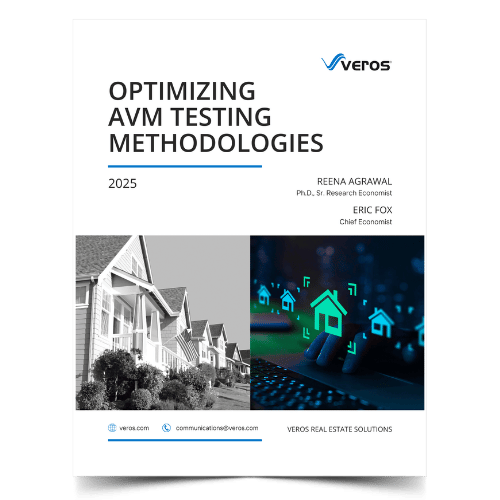The issue of racial discrimination within the housing market has long been a topic of concern, particularly in the context of real estate appraisals. At the forefront of this discourse is the examination of historical practices such as redlining and their potential impact on modern automated valuation models (AVMs). In our ongoing commitment to transparency and equity, Veros Real Estate Solutions (Veros®) is pleased to present the latest update to our research study, “Does historical redlining influence today’s AVM estimates,” authored by Reena Agrawal, Veros’ Research Economist, and Eric Fox, Veros’ Chief Economist and Senior Vice President of Analytics.
Research Background
In our initial 2023 study, we explored whether historical redlining influenced AVM predictions generated by VeroVALUESM for single-family properties in Los Angeles County, California. Contrary to some expectations, our investigation revealed that historical redlining did not impact home valuations provided by VeroVALUE in Los Angeles neighborhoods. Building upon this foundation, our February 2024 update extends our research to encompass five additional metropolitan areas across the United States: Boston, Massachusetts; Chicago, Illinois; Pittsburgh, Pennsylvania; Birmingham, Alabama; and Austin, Texas.
Key Findings
Utilizing the same rigorous methodology as in our 2023 study, we analyzed neighborhoods with historical redlining areas adjacent to non-redlined areas. Our investigation concluded that VeroVALUE valuations for properties in all five metropolitan areas remained unaffected by historical redlining. After controlling for various physical attributes, the location of a property within a historically redlined area did not emerge as a significant predictor of VeroVALUE estimates. These results suggest that AVMs can serve as reliable and equitable tools for assessing property values, regardless of historical biases.
Insights and Recommendations
Our research underscores the importance of ongoing analysis to ensure the fairness and accuracy of AVMs in the housing market. While our findings demonstrate the reliability of VeroVALUE in mitigating algorithmic bias related to historical redlining, we encourage other AVM providers to engage in similar research endeavors. By validating the absence of bias within their models, AVM providers can contribute to a more equitable valuation process.
Conclusion
The role of AVMs in promoting fairness and transparency cannot be overstated. Through our comprehensive research efforts, we reaffirm our commitment to delivering unbiased and accurate property valuations with VeroVALUE. As we continue to advance our understanding of the intersection between historical practices and modern technology, we remain steadfast in our pursuit of a more equitable housing market for all.
We invite you to explore the full report to delve deeper into our findings and recommendations, located here.
Together, let us strive for a future where every individual has equal access to the opportunities afforded by homeownership.








